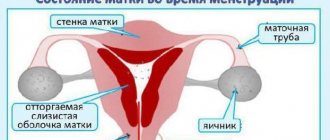30.01.2017
Thrush is a disease that occurs quite often. And there is no point in looking for a direct relationship here, because there is none. And there are only a few factors, the presence of which contributes to the appearance of thrush after menstruation.
Thrush is a fungal disease that affects the mucous membrane of various parts of the body. It often appears in women before, during or after menstruation and can occur with the appearance of varying severity of certain symptoms.
What is thrush in women?
Before you begin to understand why thrush appeared after menstruation, it is very important to understand what this disease is. In the scientific world, this pathology is called candidiasis. But among the people we call it thrush, since women have a large amount of white discharge from the vagina, very similar in consistency to cottage cheese or sour milk.
The disease provokes the development of a fungus such as candida. It lives in small quantities in the body of every representative of the fair sex, and is an important part of the female microflora. However, if for some reason the amount of this fluid begins to increase rapidly, then the woman develops a disease such as thrush. After menstruation, as well as before it, rapid growth of the fungus can cause discomfort. This will happen in any case if favorable changes have occurred in the female body.
Hygiene
The importance of hygiene has already been mentioned. In this matter, it is important to observe the “golden mean”: a deficiency, like an excess, can provoke illness. Showering outside of menstruation twice a day is sufficient. During menstruation, when hygiene measures are carried out more often, the use of detergents (soaps, gels) should be limited.
Thrush occurs if you create favorable conditions: “wash out” the natural microflora or allow excessive accumulation of natural secretions in the absence of hygiene skills.
If thrush occurs, do not use pads with fragrances, and tampons should be abandoned. Additional preventive measures will be:
- healthy lifestyle;
- maintaining immunity;
- balanced diet;
- timely treatment of hormone-dependent, infectious, viral and gynecological diseases;
- regular preventive examinations;
- following the basic rules of safe sex life: frequent changes of partners and unprotected sex can cause thrush. This happens due to the introduction of new types of fungus from a partner suffering from candidiasis, or when infected with sexually transmitted diseases.
Now you know everything about the relationship between menstruation and thrush. Although almost any woman can experience its symptoms, it is easy to avoid. It is enough to exclude risk factors so that the opportunistic fungus remains part of the normal microflora and does not provoke acute or chronic disease.
Why does thrush appear after menstruation?
Some women face the problem of cheesy discharge after menstruation. There are several reasons why this could happen:
- Thrush may appear after menstruation if a woman has chosen the wrong personal hygiene products. Thus, synthetic scented tampons and pads can provoke the occurrence of this disease.
- Another reason why thrush occurs every time after menstruation is a woman’s failure to comply with all hygiene requirements. Do not forget that you need to wash at least twice a day, as well as change your underwear. Moreover, it should be sewn from natural fabrics that are pleasant to the body.
- A fairly common cause of this disease is a hormonal imbalance during the menstruation process itself. As a result, the microflora changes, and pathogenic microorganisms begin to actively multiply in it.
- Why does thrush appear after menstruation? Pay attention to your immune system. Quite often, it is weakened immunity that gives impetus to the active reproduction of pathogenic fungal microflora.
What causes candidiasis after the menstrual cycle?
During menstruation, the female body is very vulnerable to various external factors: bleeding leads to a weakening of local immunity and hormonal changes. These factors favor the yeast fungus Candida, which leads to the development of the disease. That is why thrush often overtakes a woman during this period.
Among the main reasons for the progression of the disease during menstruation:
- hypothermia. Immediately after critical days, a woman should take care of herself: refuse to wear short skirts and clothes made of thin fabrics (especially in cold weather);
- ignoring the rules of personal hygiene. The patient should shower regularly (twice a day). It is recommended to use special intimate hygiene products for washing. Traditional soap or shower gel eliminates “good” vaginal bacteria, which leads to the development of candidiasis;
- wearing sanitary pads made from synthetic materials. The top layer of the hygiene item should not be hard or covered with mesh. Preference should be given to pads with a soft surface and without fragrances (they can lead to a sharp allergic reaction, which results in thrush);
- use of shared (unwashed) linen and towels.
Attention! In order to protect the body from adverse environmental factors during menstrual periods, special attention should be paid to strengthening the immune system.
After the end of menstruation, a woman suffering from thrush notices a much larger amount of whitish discharge. The reason for this is the release of a portion of the pathogenic flora from the vagina along with blood clots. Another alarming symptom that clearly indicates the spread of fungus is an increased burning sensation. This also includes pronounced pain during and after menstruation. The patient also notices the prolonged nature of her critical days.
Why the disease may begin to develop immediately before menstruation
Let's also consider the main causes of thrush before menstruation:
Presence of thrush during menstruation
It is very important to pay attention to the fact that thrush can occur in women during menstruation. In this case, the cheesy discharge will mix with the blood, so women may think that this is how the endometrium leaves the body, and simply not pay attention to this phenomenon. However, the presence of candidiasis can cause a very strong unpleasant odor, as well as a burning sensation in the area of the external genitalia. At the same time, thrush can prolong your period and make it more painful.
Please note that if you do not treat thrush (it doesn’t matter when it started: before, after or during your period), the disease may become chronic and begin to bother you regularly.
Thrush as a sign of pregnancy before delay
Can thrush be a sign of pregnancy? Maybe. If you lead an active sex life and do not use protection, you should be wary of the following phenomena:
- drowsiness that does not go away even after a full night’s sleep;
- fatigue;
- headache;
- mood swings;
- feeling of heaviness in the lower abdomen;
- change in the nature of vaginal discharge;
- swelling, tenderness of the breast.
Most of these first signs of pregnancy also manifest themselves during PMS, so you shouldn’t run to the pharmacy for a test until the most reliable sign appears - delayed menstruation. And yet, thrush as the first sign of pregnancy before a delay is very likely. Before menstruation begins (after ovulation, in the second half of the cycle), hormonal levels become slightly unstable, and immunity decreases slightly. The fungus is extremely sensitive to these changes.
Main symptoms of pathology
If thrush always starts after menstruation, this is a serious reason to consult a gynecologist for advice. There may be a very serious problem behind this simple fungal disease. Every woman should become familiar with the symptoms of thrush in order to recognize this pathology in time and begin to treat it in a timely manner. And so, let's look at what symptoms such a common disease as thrush of the female genital organs has:
The main causes of the disease
Many factors can trigger the development of thrush. Experts identify a number of the most common reasons. First of all, this is the use of antibiotics.
Recently, the practice of uncontrolled, thoughtless use of medicines has spread. Often, people independently diagnose themselves and select medications for treatment, sometimes not realizing that such treatment leads to a deterioration in their health.
In some cases, specialists prescribe medications to eliminate the disease. At the same time, every patient should remember that antibiotics are by no means a safe medicine. They can lead to problems such as: thrush, upset stomach, problems with digesting certain foods.
This is explained by the fact that antibiotics destroy not only pathogenic microflora, but also beneficial microorganisms. Lactobacilli in the body serve as a kind of barrier that does not allow yeast fungi to multiply uncontrollably.
For this reason, if treatment with antibiotics is necessary, probiotics should be taken at the same time, which will soften the effect of the medicine.
Constantly wearing synthetic underwear causes the development of thrush. This is explained by the fact that the fabric from which such underwear is made does not allow air to circulate freely, fits tightly to the body, and impairs heat transfer. As a result, the intimate area heats up and sweats. High temperatures and humidity are excellent conditions for rapid growth of fungus.
There are also such provocateurs of the disease:
- Pregnancy. Women very often encounter thrush during pregnancy. This happens due to hormonal imbalance. If a disease occurs, you should immediately inform your doctor.
- Oral contraceptives. They cause a decrease in pH levels, which is a natural barrier to pathogenic microorganisms. Women using such contraceptives experience discomfort during menstruation, when estrogen levels increase significantly.
- Unbalanced diet;
- Diseases of the endocrine system;
- Immunity problems;
- Intoxication;
- Damage;
- Intimate connections.
The appearance of candidiasis is a sign that some negative phenomena are occurring in the body. To eliminate a disease, it is necessary to identify the cause of its occurrence. Only after curing it can we talk about a complete cure for thrush.
How to determine candidiasis?
Without practical skills and medical education, it is not possible to correctly diagnose your disease. Symptoms characteristic of candidiasis are often characteristic of other diseases. In addition, the signs of thrush directly depend on the cause of its occurrence and the stage of development.
The exacerbation stage is characterized by the following symptoms:
- Burning of the genital mucosa, constant itching. Discomfort intensifies with the onset of evening and before the onset of critical days. After menstruation there is temporary relief. During this period, many women decide that candidiasis has passed. However, after some time the symptoms reappear.
- The appearance of discharge with an unpleasant odor, a cheesy consistency and a yellowish color. Their abundance depends on the stage of the disease. With advanced candidiasis, the color of the discharge may be greenish or brown.
- Small rashes with liquid inside. Hyperemia and edema are common. When urinating, women experience pain, since urine coming into contact with fungal-affected areas of the skin causes irritation.
How do you know if thrush is gone?
Thrush is a disease that does not go away on its own. Self-medication in this case can only lead to a worsening of the condition. All remedies aimed at eliminating symptoms cannot cure the disease. They only remove the discomfort and pain, but the problem remains. Many women, using popular remedies for thrush, hope that they will cope with this disease on their own, but as a result they end up with a chronic disease that leads to a number of complications. The main side effect of advanced disease is problems with reproductive function. The likelihood of the baby becoming infected during childbirth also increases.
Self-medication in this case is unacceptable. Many medications suppress the immune system. This leads to the spread of fungal disease and difficulties in treatment.
Even specialists sometimes find it difficult to eliminate candidiasis. This is explained by the fact that this disease is not only transmitted through sexual contact. Candidiasis indicates that negative phenomena are occurring in the human body, which affect the level of hormones and immunity.
For this reason, a complete examination should be performed before treating thrush. It will help identify concomitant diseases. When diseases that affect the vital functions of the body are detected, they are treated first.
After which the doctor prescribes drugs that stimulate the immune system, help eliminate dysbiosis, and restore vaginal acidity. In addition, experts strongly recommend following a diet rich in proteins, microelements and vitamins.
You should completely exclude foods that have a beneficial effect on yeast.
- Medicines. The specialist selects them individually. Due to the widespread spread of the disease and the uncontrolled use of medications, the fungus has become resistant to many drugs. Therefore, only a doctor can make the right choice among a wide range of medications.
- Ointments and suppositories;
- Diet.
The very first signs of thrush
The causes, symptoms and treatment of thrush are described in this article. It always starts the same way, so it’s simply impossible not to notice it. Let's consider how it makes itself felt from the very beginning of its occurrence:
The nature of discharge in thrush
In most cases, a woman can easily diagnose candidiasis herself, especially if she has already had to deal with its manifestations before. The signs of thrush during pregnancy do not differ from those in the “non-pregnant” state. This:
- itching, soreness in the vagina;
- constant curdled leucorrhoea;
- increased discharge in the evening and at night.
Attempts to cope with discharge using hygiene procedures have the opposite effect: the symptoms become more pronounced. All symptoms and signs intensify, making it difficult to lead a normal lifestyle. Thrush, which appears in the early stages, causes significant discomfort. In the first trimester there are already many new, unusual sensations that complicate life, and then there is candidiasis.
Thrush as a sign of early pregnancy deserves close attention from both the doctor and the patient. Despite the fact that it is, in general, a variant of the norm, the disease cannot be left to chance - it is imperative to diagnose and treat thrush if it has clinical manifestations.
Use of oral tablets
Both tablets and products for vaginal use have their advantages. Thus, oral medications can be taken on any day of the cycle, regardless of menstruation. There are a lot of effective remedies for thrush for women intended for internal use. Some of them need to be taken for one week, while for other treatments you only need one day.
Usually the tablets are very effective and can quickly relieve the patient of her troubling symptoms. However, it is worth considering that they have not only advantages, but also disadvantages. Oral medications can have a large number of undesirable effects on the female body.
Use of vaginal suppositories
Today there are simply a huge number of effective remedies for thrush for women. Quite often, gynecologists prescribe to their patients drugs intended specifically for topical use, since they do not enter the systemic bloodstream, which means they cause less harm to the body. Of course, you can use them before and after your period. However, if you still have spotting, you should not use this method.
According to experts, treatment for thrush during menstruation is usually not very effective. Therefore, it is best to start this process after they are over. Otherwise, the symptoms of the disease will simply weaken while you decide that you have already gotten rid of it. This way the disease will imperceptibly become chronic.
The drug "Nystatin"
Nystatin suppositories and tablets (instructions for use for thrush are included in each package) are quite often prescribed by gynecologists to women who suffer from this disease. This drug has two release forms. Depending on your condition, your doctor will tell you which one you should buy. In some cases, it is recommended to use the product both topically and internally. This way the healing effect will come much faster.
The tablets are taken two to three times a day for two weeks. Usually this period is quite enough to prevent the disease from becoming chronic.
Suppositories are inserted into the vagina twice a day for ten to fourteen days. The product should be used only after hygiene procedures. Insert the suppository as deeply as possible into the vagina, and then lie on your back for a while.
Nystatin suppositories and tablets, instructions for use for thrush, which are described in this article, are indeed very effective in the treatment of vaginal candidiasis. However, do not forget that under no circumstances should you self-medicate. Only a qualified doctor can tell you whether this remedy is right for you. He will determine whether it is suitable for treating thrush after menstruation for you.
Treatment of candidiasis
Sometimes women doubt whether thrush goes away on its own after menstruation. The gynecologist will tell you for sure that without appropriate intervention the disease will not disappear.
It will come back again and again, provoking more and more negative changes in the body. To avoid problems, you should be examined by a specialist. He will select the necessary methods of influence that will be effective and safe.
Treatment most often includes the use of:
- Vaginal suppositories.
- Mazey.
- Tablets.
To restore the local microflora, vaginal suppositories are inserted into the vagina at night. They are selected by the attending physician based on examination and tests.
The most popular are the following suppositories and suppositories:
Among the ointments, Clotrimazole is actively used. It is applied to the genitals for 5-7 days after following all hygiene procedures. Sometimes the drug is used longer, until the symptoms disappear completely. The tablets used are Nizoral or Trichopolum, which require a course of treatment.
All medications are prescribed by a gynecologist taking into account the patient’s age, the presence of concomitant diagnoses and possible allergic reactions.
Traditional medicine recommends douching and baths with medicinal herbs. Usually they brew soda, chamomile, oak bark or string. Then the broth is cooled to a comfortable temperature and the appropriate procedures are performed.
Douching and baths perfectly complement the basic treatment selected by the gynecologist. Self-medication can provoke complications that will then have to be treated for years.
Preventive measures
In fact, thrush can be prevented by following some recommendations from experts. Namely:
- Work on strengthening your immune system.
- Develop the habit of eating healthy. Reduce your consumption of sweet and starchy foods, as well as highly spicy, fatty and salty foods.
- Consume fermented milk products, as well as fruits and vegetables daily.
- Do not self-medicate with antibiotics. Such drugs should be taken in short courses and under the strict supervision of a doctor.
- And, of course, take care of personal hygiene of the genitals.
Can the disease go away on its own?
Many representatives of the fair sex are interested in the question of whether thrush goes away after menstruation. For some reason, women hope that the disease can disappear after menstruation on its own. However, miracles do not happen. If you notice that the symptoms are no longer so pronounced, this only indicates that the disease has subsided at the moment. But as soon as you get cold or stressed, you will face this enemy again. Therefore, it is very important to treat thrush regardless of the day of the cycle.
During menstruation, you should not use products intended for topical use. At this time, treatment can be carried out only with oral medications, or if there are contraindications to them, simply take care of your immune system. But after your period is over, you can begin local treatment.
Candidiasis after ovulation - causes, symptoms, treatment
Thrush is a fairly common gynecological disease, the occurrence of which is influenced by many factors. The disease is often associated with pregnancy and ovulation.
Symptoms of the disease
Thrush has a fairly pronounced clinical picture in women and goes away almost unnoticeably in men. Symptoms of the disease are as follows:
- Itching and burning in the vagina;
- Sensitivity, redness of the vaginal walls;
- Painful sensations during urination;
- White, abundant discharge of a thick consistency;
- In case of complications, blood may be present in the urine.
Sometimes candidiasis is asymptomatic in women, and it can only be determined after taking a smear for bacteriological culture. Treatment of candidiasis should begin as quickly as possible, since the chronic form of the disease is difficult to treat and can worsen with any decrease in immunity.
Causes of candidiasis
The causes of the development of the disease lie in the excessive proliferation of the fungus of the Candida family. When the vaginal microflora changes under the influence of external or internal factors, the proliferation of the fungus is not regulated by the immune system.
Other risk factors:
- Decreased immunity due to illness or seasonal changes;
- Promiscuous sexual intercourse;
- Change of sexual partner;
- Long-term treatment with antibiotics;
- Using hygiene products with an acidic pH;
- Wearing tight underwear made of synthetic fabrics;
- Hypothermia.
Often, thrush develops precisely because the immune system is weakened, as it loses control over the microflora of the vaginal mucous membranes.
Connection with ovulation
Thrush after ovulation is not a normal condition of a healthy body. To determine the reasons why thrush begins to show its symptoms after ovulation, you should study the mechanism of ovulation.
Ovulation is the release of an egg by the dominant ovarian follicle into the fallopian tube. The egg has matured and is ready for fertilization by sperm. All these processes are regulated by hormones:
- Estrogen;
- Estradiol;
- Follicle-stimulating hormone;
- Luteinizing hormone;
- Progesterone;
- Prolactin.
The levels of these hormones can change dramatically depending on the phase of the cycle. Accordingly, before ovulation, the concentration of hormones reaches a peak and then gradually decreases. Such hormonal changes can lead to qualitative changes in the vaginal microflora, and thrush after ovulation will appear especially in those who chronically suffer from this disease.
Pregnancy connection
Many women believe that thrush is a sign of pregnancy, and at the slightest delay they regard this as a sure sign. On the one hand, the appearance of thrush can be triggered by fertilization of the egg, since both the hormonal background and the immune system begin to work differently.
During pregnancy, the work of the immune system is aimed at preserving the fetus, therefore the mother’s body is protected to a lesser extent. For this reason, any woman can develop thrush at the beginning of pregnancy.
On the other hand, thrush is considered a sign of pregnancy only when there are other signs of pregnancy at the appropriate stage.
How to evaluate thrush
Candidiasis cannot be a direct consequence of pregnancy. Its development will be triggered by pregnancy through its influence on hormonal levels and the immune system. Since the immune system will direct its work to protect the fetus, regulation of the microflora of the vaginal walls occurs to a lesser extent.
Hormonal changes can lead to qualitative changes in the composition of the microflora, as a result of which the number of lactic acid bacteria will decrease, opening access to fungi and infections.
Another reason is the so-called thrush syndrome among pregnant women. Abundant white discharge from the vagina may indicate the formation of a vaginal plug to retain the fetus. And only if they are accompanied by itching and burning, can the presence of thrush be suspected.
Early signs
Thrush after conception can be regarded as a symptom of pregnancy only if there are other symptoms:
- Delay of menstruation from five days;
- Increase in basal body temperature;
- Pulling sensations in the lower abdomen and lower back.
Sometimes a woman does not feel any symptoms; in other cases, emotional instability, changes in taste preferences, and high sensitivity of smell are added.
Thrush in most cases is a consequence of decreased immunity and changes in hormonal levels. It is possible to answer in the affirmative to the question whether it can become a symptom of pregnancy before a delay only if there are accompanying symptoms.
Early detection
If, in addition to thrush and delayed menstruation, other symptoms are present, it makes sense to diagnose pregnancy yourself. The most accurate ways to determine pregnancy at the beginning of the first trimester:
- Analysis of hCG in urine using rapid tests;
- Analysis of hCG in the blood in the laboratory;
- Measuring basal body temperature.
HCG in urine is determined using pregnancy tests, and even a weak second line can indicate a positive result. HCG in the blood is determined in the laboratory, for this you need to donate blood from a vein on an empty stomach - each period of pregnancy corresponds to a certain range of hCG concentrations in the blood.
Basal body temperature is measured in the rectum immediately after waking up. It is easier to assess it for those who kept a temperature chart, but an increase to 37°C can also indicate pregnancy.
Negative test
Sometimes rapid tests show a negative result, and later it turns out that the woman is indeed pregnant. To get reliable results, use test strips that have not expired and run multiple tests.
Reliable results can only be obtained in the first three days of the delay; before that time, the concentration of hCG is still too low to be reflected in the test results.
On the seventh day of the delay, a repeat test is performed - the concentration of hCG in the urine reaches a level that can be determined. To diagnose pregnancy even before a delay, it is better to donate blood.
Complications
If you detect symptoms of thrush against the background of a delay, you should take a blood test for hCG. The reasons for this diagnosis are as follows:
- Possibility of fetal infection if a woman is pregnant;
- Elimination of complications that could cause a delay;
- The development of treatment tactics directly depends on whether the patient is pregnant or not.
Delay and thrush may not always be a sign of pregnancy. Complications of thrush on the ureters and bladder, manifested in cystitis, can lead to delayed menstruation. In this case, the result of a blood test for hCG will let the doctor know which treatment to choose:
- Treatment of cystitis and thrush as the root cause;
- Treatment of thrush during pregnancy.
It is strictly forbidden to make decisions about treatment on your own, since during pregnancy you can harm the fetus and cause miscarriage with inappropriately prescribed medications.
Treatment during pregnancy
If candidiasis is detected, both partners should be examined. Men can be carriers of the fungus asymptomatically, while after each sexual intercourse a woman will again be bothered by relapses of thrush. For diagnosis, men are prescribed a smear and bacteriological culture. When the disease is confirmed, treatment is carried out with ointments and tablets.
Most traditional medications are contraindicated for women during pregnancy. The drug should be prescribed by a gynecologist after receiving culture results and examination. Approved drugs and treatment methods:
- Suppositories based on Natamycin - Pimafucin, Primafungin;
- Suppositories based on Nifuratel and Nystatin - Macmiror complex;
- From the second trimester - Nystatin, Clotrimazole;
- A solution of sodium tetraborate in glycerin;
- Suppositories Gino-Pevaril;
- Vaginal cream Ginofort;
- Douching with a decoction of chamomile and calendula.
Other drugs contain contraindications for pregnant women, since they are based on hormonal components or antimycotic substances that penetrate the placental barrier.
Treatment outside of pregnancy
Since thrush is the cause of delay in complicated cases, treatment is carried out systemically. The same medications are prescribed as for pregnant women, but can also be used:
- Terzhinan;
- Polygynax;
- Zalain;
- Clotrimazole-Candide;
- Isoconazole;
- Butoconazole.
A diet low in sugar and other carbohydrates, wearing only loose underwear made from natural materials and using only neutral hygiene products is recommended.
Due to the fact that thrush is a fairly common disease, it “gathers” many questions around itself, in particular about how thrush affects menstruation, can there be a delay in menstruation due to thrush? Let's try to figure it out and answer your questions.
The relationship between menstruation and thrush
Everyone knows perfectly well what menstruation is - it is regular bleeding that occurs as a result of non-fertilization of the egg and rejection of the epithelium. Normally, the menstrual cycle (the one that begins on the first day of menstruation and ends on the last day before the onset of the next one) ranges from 21 to 35 days.
As you know, the most “desired” reason for a missed period is possible pregnancy.
Also, a delay in menstruation can be a consequence of any hormonal disorders, insufficiency of the second phase, or can be caused by frequent stress, emotional overload, physical activity, etc.
A common disease that affects every fourth woman or girl is thrush. Thrush is usually accompanied by redness of the genitals, burning, itching and cheesy discharge.
Let's figure out what the relationship may be between the causes of thrush (thrush itself) and menstruation, and is it possible to delay menstruation only because of thrush?
So, what can cause thrush before your expected period and its delay? Candidiasis that occurs before the delay may be the result of multiple factors. As a rule, these are frequent emotional stress, physical activity, hypothermia, sexual intercourse with a sexual partner who is a carrier of candidiasis.
Candidiasis before the delay can also be provoked by any other diseases of the genital area. The cause of thrush that occurs before the delay can be multiple factors related to the hygiene of the genital organs, ranging from intimate hygiene products to washing powder for underwear.
If thrush occurs before the delay, it must be treated immediately, especially if there is an exacerbation of symptoms.
You should not treat candidiasis on your own; it is better to get examined by a doctor and determine the possible causes of this problem. Perhaps these are some kind of inflammatory processes, untimely treatment of which can cause adhesions, which will ultimately lead to possible complications of conception or even infertility.
As a rule, the occurrence of thrush in this case cannot be the cause of the delay, since already 2-3, maximum 7 days after the start of treatment, any of its symptoms disappear. Of course, it is not recommended to treat candidiasis with antibiotics, since such treatment may slightly change the usual menstrual schedule.
Possibly pregnancy?
What can thrush and the onset of delay indicate? A delay in menstruation and the occurrence of candidiasis is always a reason to think, first of all, that it was the present candida infection that provoked the failure of menstruation? Is it so? Can candidiasis affect the course of menstruation?
There are several causes of candidiasis and delayed menstruation that occur simultaneously. The most pleasant thing for many women is a possible pregnancy. But what does candidiasis have to do with it? The fact is that after the fertilization of the egg by the sperm and after its attachment to the wall of the uterus, where further growth of the fetus will continue, the active production of hormones such as progesterone and human chorionic gonadotropin occurs.
Of course, progesterone rises in the second phase of the cycle even without fertilization of the egg, but such an increase is within normal limits and does not provoke serious hormonal changes in the woman’s body.
After fertilization, these hormones, including progesterone, increase significantly. It is these hormonal changes caused by pregnancy that can cause not only the absence of menstruation, but also the cause of candidiasis.
Therefore, if menstruation is delayed and thrush is present, it makes sense to take a pregnancy test, especially in cases where there has been unprotected sexual intercourse.
But here it should also be noted that, as a rule, candidiasis, which is a sign of pregnancy, can occur only after 7 days or even several weeks. You should not assume that, say, if yesterday or the day before yesterday you had unprotected sexual intercourse, and symptoms of candidiasis immediately appeared, then this is definitely pregnancy.
If symptoms (itching, burning) occur 1-3 days after sexual intercourse, then, most likely, you received the disease from your sexual partner, so it makes sense for both to undergo examination and treatment.
If a weak second line appears, do the test again in a few days. If the test streaks and spotting appears, consult a doctor immediately, as this may indicate an incipient miscarriage. It should also be noted that discharge from candidiasis does not affect test results in any way.
If the test is negative, you should be examined by a doctor, where he will determine the possible causes of the delay. You should not ignore the body’s signals (in this case, candidiasis), since this may indicate serious diseases of the genitourinary system.
This disease in young virgin girls can be caused by hormonal changes in the body, during which it prepares for the upcoming menstrual function.
In older women (45-55 years old), curdled discharge and absent menstruation may indicate the onset of menopause.
Possible causes of delay and concomitant thrush
Most gynecologists say that thrush does not affect menstruation in any way. This is true if it is properly treated in a timely manner and does not experience the effects of advertised drugs.
But if it is not treated in a timely manner or you do not seek help from a doctor with the hope that it will “go away on its own,” then menstrual irregularities may occur as a result of the fact that candida fungi have penetrated into the upper parts of the reproductive system. They multiply in the uterus and ovaries, which in the future can cause an inflammatory process and even cause adhesions in the fallopian tubes.
At this stage, special treatment is prescribed that will help cope with fungi and eliminate their pathogenic effects. It is imperative that after completion of treatment you need to undergo a re-examination by a gynecologist. After treatment, menstruation should return to normal.










